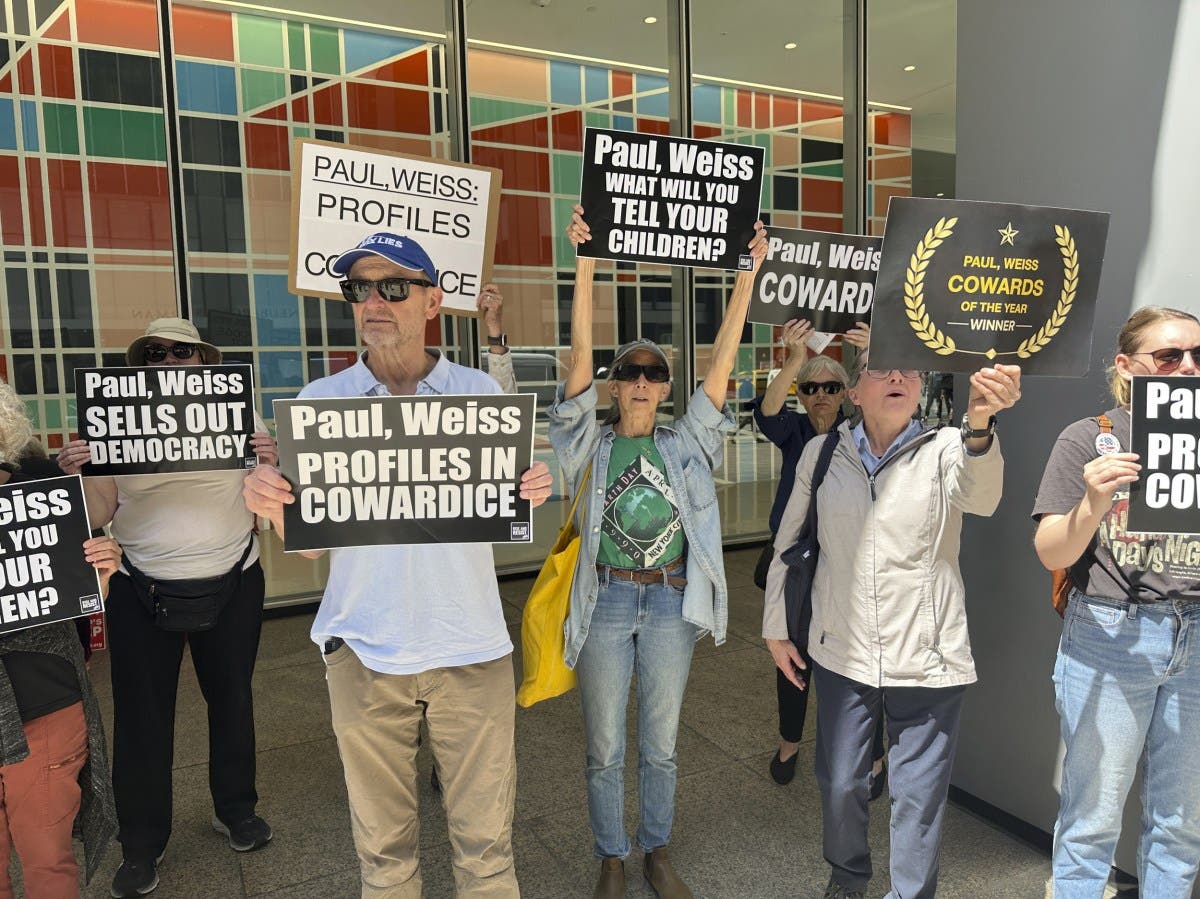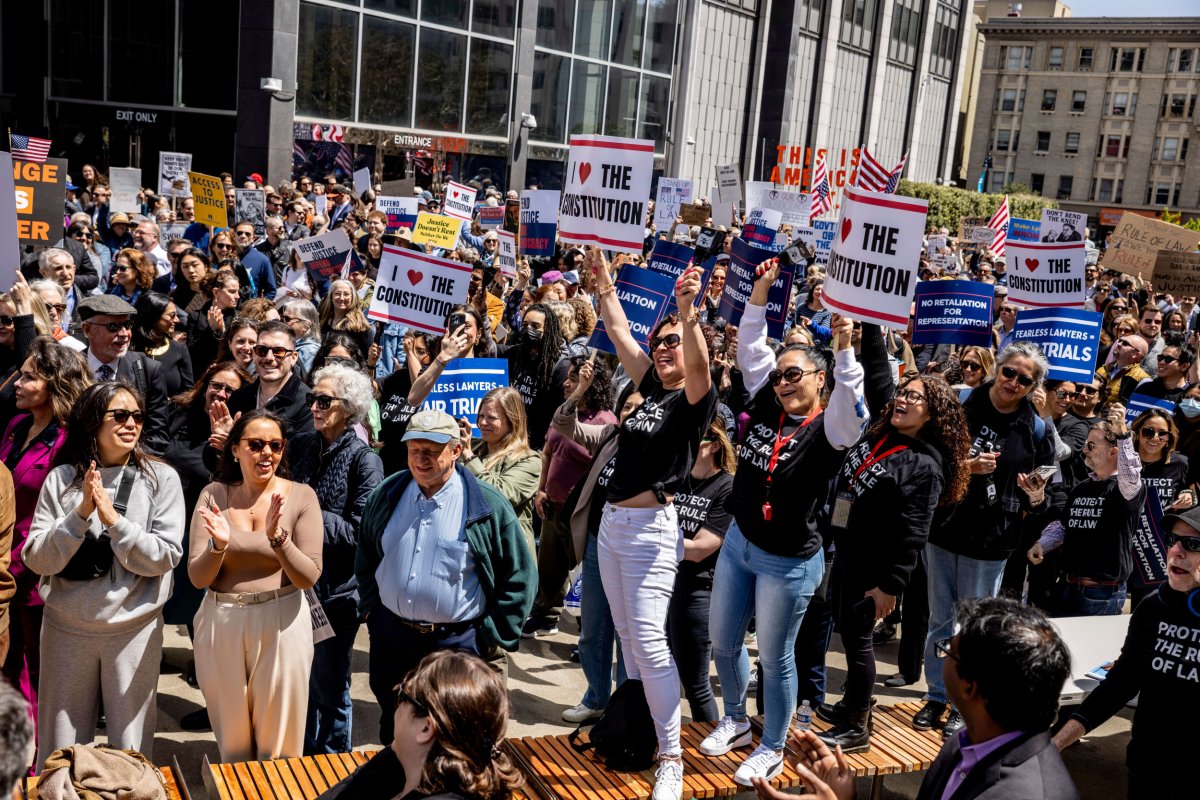
Major companies abandon law firms that signed deals with Trump: report
Law firms that struck deals with the Trump administration are facing corporate consequences according to reports.
Major Companies Abandon Law Firms That Signed Deals with Trump: Report
Published Jun 02, 2025 at 8:11 AM EDT
By Sophie Clark
Live News Reporter
Major companies in the U.S. have begun shifting legal work away from prominent law firms that struck deals with the Trump administration, according to The Wall Street Journal.
The WSJ reported on a legal luncheon at Manhattan's Cipriani restaurant in May, where Brooke Cucinella, a top lawyer at the hedge-fund Citadel, told other lawyers present that they like working with lawyers who don't run from a fight.
Not only are firms that struck deals losing clients, but those actively challenging the Trump administration in court are attracting new corporate business, per the WSJ.
Newsweek has contacted two firms in legal fights with the Trump administration via email for comment.

Demonstrators outside the law offices of Paul Weiss in New York protesting the firm's agreement to do free legal services for the Trump administration, Tuesday, April 22, 2025.Ted Shaffrey/AP Photo
Why It Matters
Firms' decisions to either challenge or cooperate with the Trump administration's executive orders are now influencing high-stakes client choices with financial and reputational repercussions.
The situation also raises broader questions about the independence of the legal profession and the potential long-term impact of political pressure on corporate legal partnerships.
What To Know
Beginning in late February 2025, President Donald Trump issued several executive orders directing federal agencies to strip certain law firms of government security clearances and to remove those firms' clients from lucrative federal contracts.
The administration alleged these firms represented political opponents or had adopted practices it considered harmful. Four prominent firms—Jenner & Block, Perkins Coie, WilmerHale, and Susman Godfrey—chose to challenge the orders in court.
Several other law firms targeted by these orders opted to cut deals to avoid disruption. These deals involved promising to do pro-bono work, some of this work will be defending police officers accused of wrongdoing.
Legal executives from at least 11 major companies are redirecting assignments away from firms that made pacts with the White House, the WSJ reported. Oracle, Morgan Stanley, an unnamed airline, a pharmaceutical company, and McDonald's have all moved or considered moving legal work, in some cases explicitly citing dissatisfaction with the firms' response to White House pressure. Microsoft raised conflict-of-interest concerns with Latham & Watkins, temporarily removing the firm from its preferred counsel list before reinstating it after further discussions.
Law firms which chose to sign deals with the administration are not only facing financial stress due to a reported drop in clients, but are also facing internal protest and resignations.
Partners and associates at firms including Paul Weiss, Kirkland & Ellis, Skadden, Simpson Thacher, and others, expressed anger and frustration over what they perceived as a retreat from defending the firm's independence.
Four senior partners at Paul Weiss, one major firm which reached a settlement with the Trump administration, have quit to form their own firm.
The law firms that challenged the administration's orders—Jenner & Block, Perkins Coie, WilmerHale, and Susman Godfrey—noted an influx of business from large companies seeking to reward their stance, according to interviews the WSJ carried out with general counsels at multiple corporations.
Judges have blocked or struck down Trump's orders against WilmerHale, Jenner & Block, and Perkins Coie, calling them unconstitutional acts of retaliation
Jenner & Block was targeted "because of the causes Jenner champions, the clients Jenner represents, and a lawyer Jenner once employed," ruled U.S. District Judge John Bates.
Bates, appointed by former President George W. Bush wrote, "Going after law firms in this way is doubly violative of the Constitution," adding that the administration sought to "chill legal representation" it didn't like.

Attendees gather in a rally organized by the Bar Association of San Francisco in support of attorneys and law firms targeted by President Donald Trump, San Francisco, Thursday, May 1, 2025. Stephen Lam/San Francisco Chronicle via AP
What People Are Saying
Jon Palmer, General Counsel of Microsoft, told the WSJ: "The Latham agreement created concerns about potential conflict of interest issues that could have affected the firm's ability to represent Microsoft...[Latham's leaders] provided the strong assurances we needed to address our concerns."
Jenner & Block, said in a statement in March: "[Making a deal with the White House would mean] compromising our ability to zealously advocate for all of our clients and capitulating to unconstitutional government coercion, which is simply not in our DNA."
What Happens Next
Judicial challenges to Trump's executive orders are ongoing, with courts so far siding with law firms that mounted legal opposition.
Corporate clients, meanwhile, are expected to continue evaluating their legal relationships based on firms' responses to government pressure, with many indicating a sustained preference for firms seen as maintaining independence.





 or they just want to get in on the cash grab
or they just want to get in on the cash grab